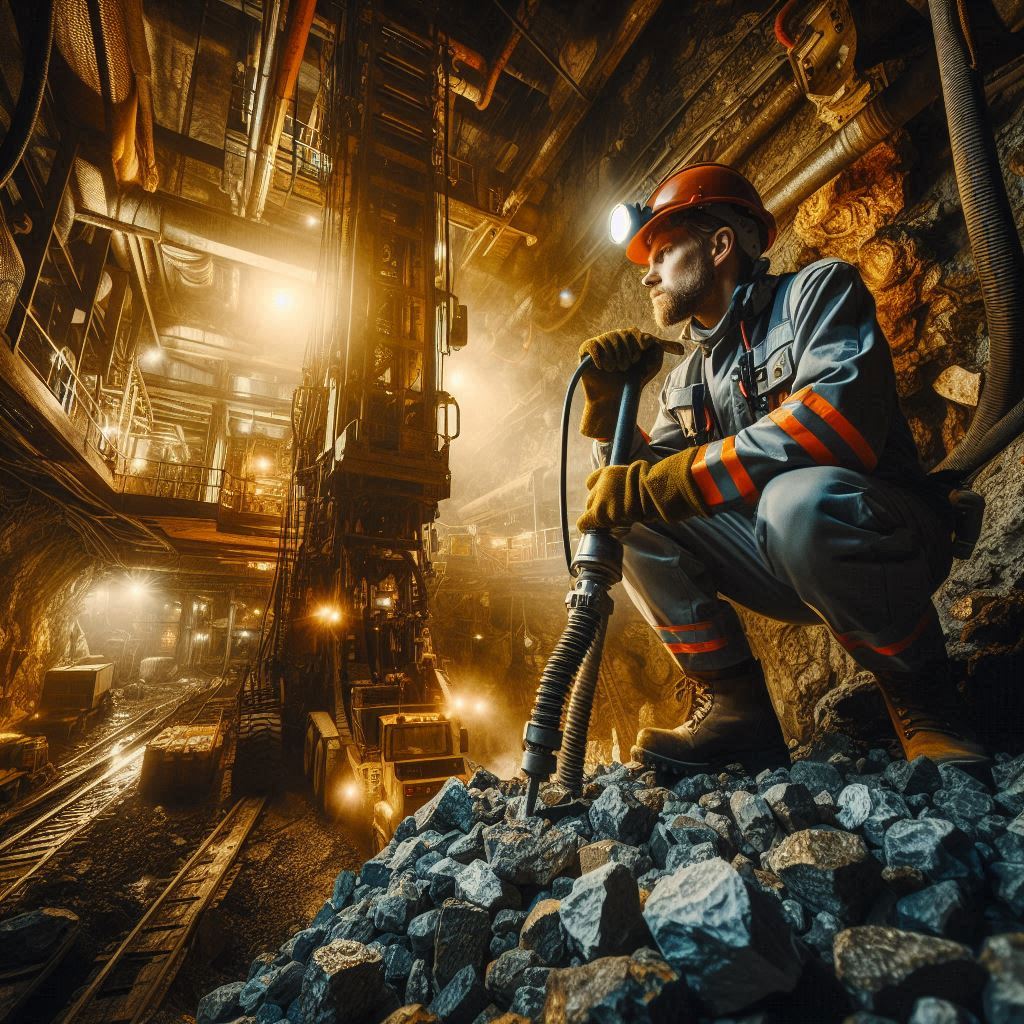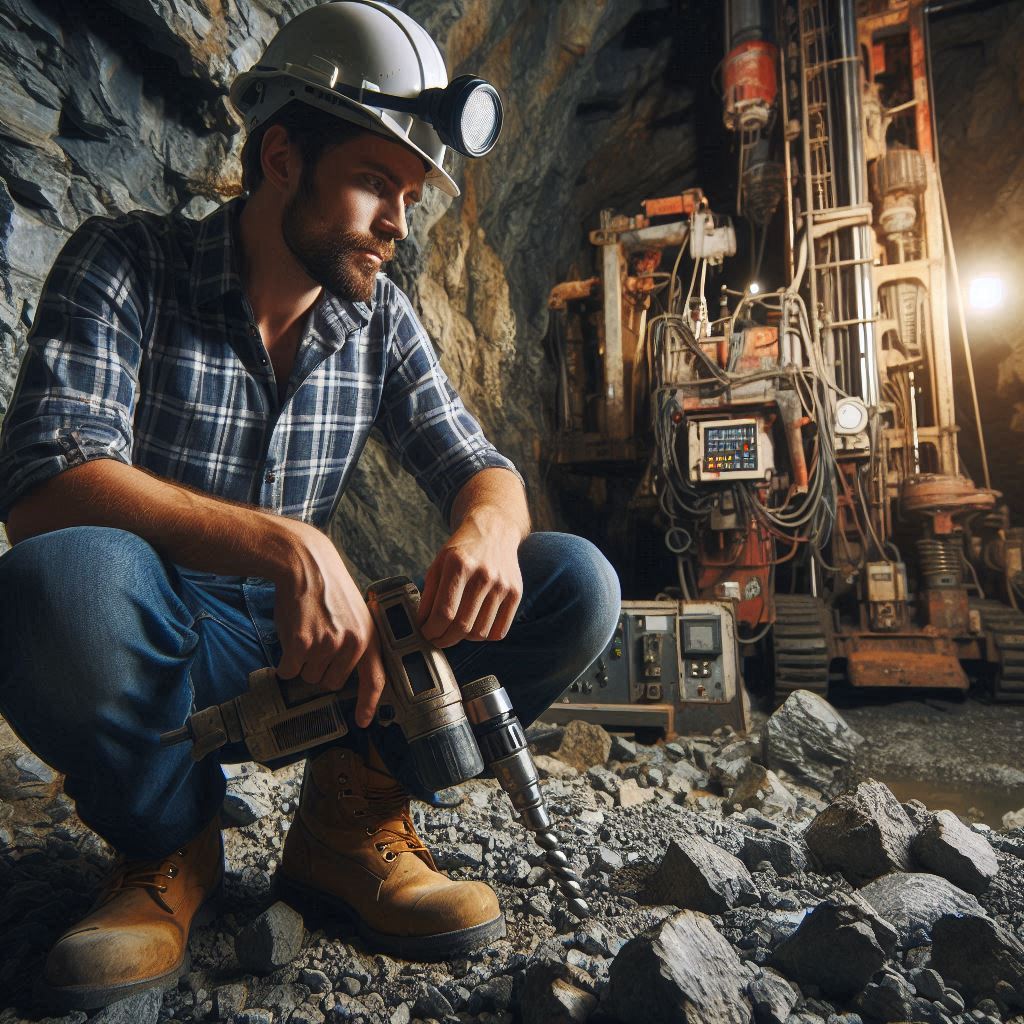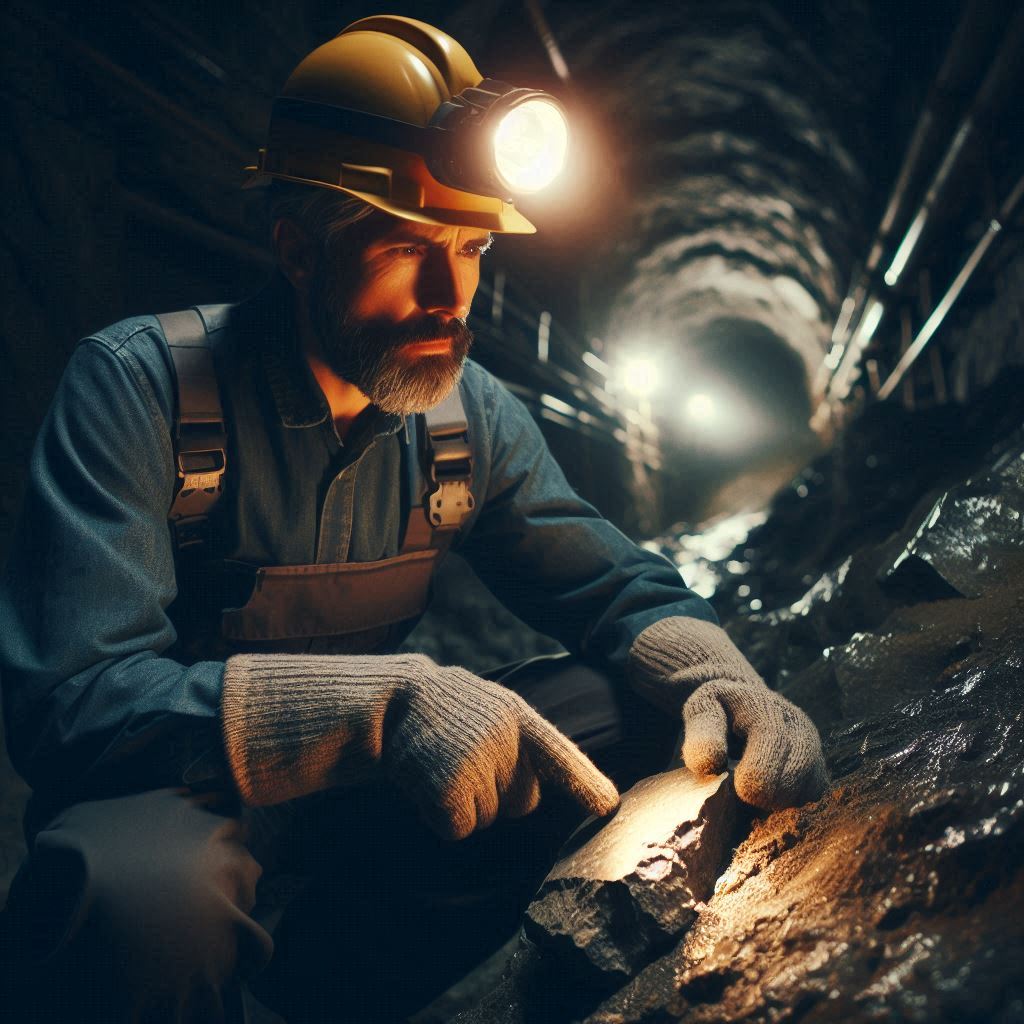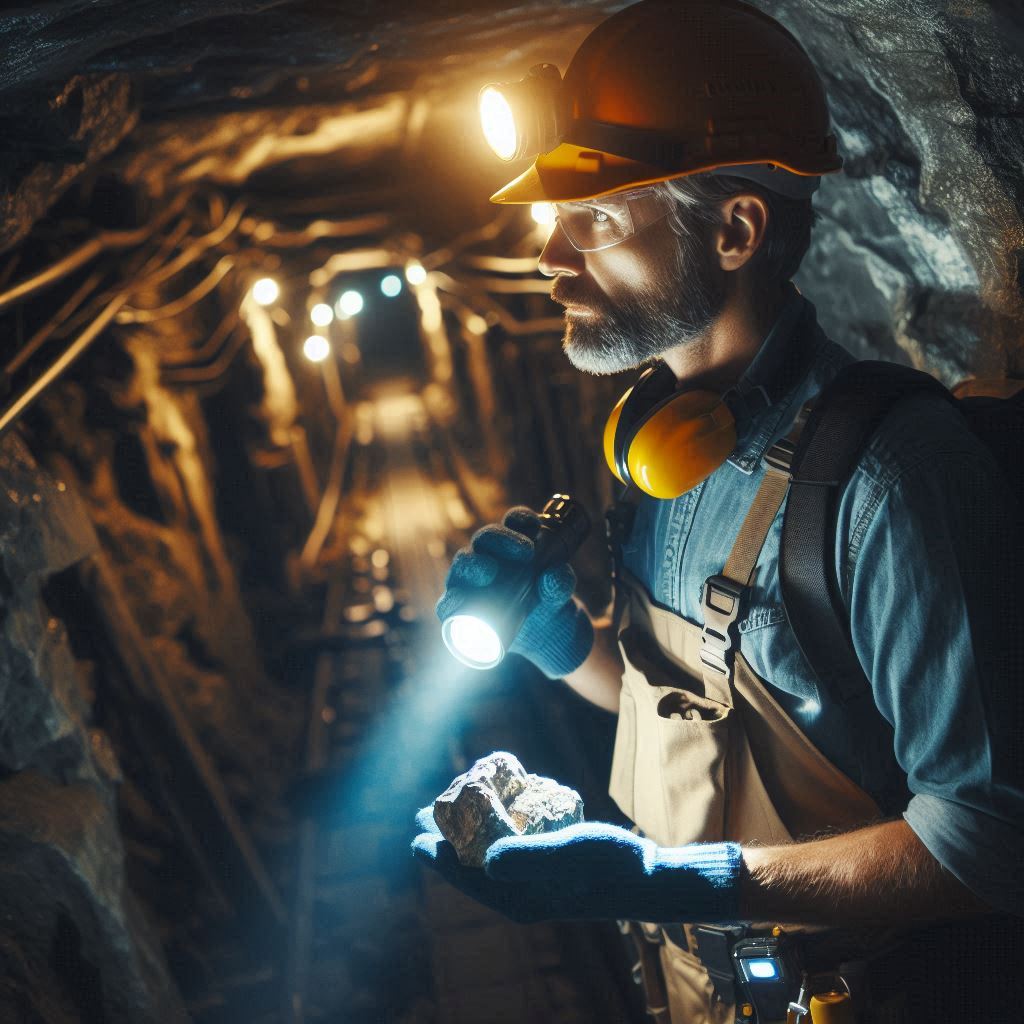Introduction
Introduce the Topic of Being a Mining Engineer
A mining engineer plays a crucial role in the extraction of valuable minerals from the earth.
Their job involves designing and overseeing mining operations to ensure efficiency and safety.
Mining engineers work in a variety of settings, from open-pit mines to underground operations.
They must use a combination of engineering skills and geological knowledge to manage mining projects effectively.
This profession demands a deep understanding of both technical and environmental aspects.
The Importance of Mining Engineers in the Industry
Mining engineers are essential for the mining industry‘s success.
They help maximize resource extraction while minimizing environmental impact.
Their expertise ensures that mining operations run smoothly, from planning and design to execution and closure.
Mining engineers are responsible for maintaining safety standards and complying with regulations.
They work closely with geologists, environmental scientists, and other professionals to address challenges and optimize operations.
Their contributions are vital for the industry‘s growth and sustainability.
Set the Stage for Discussing a Typical Day in the Life of a Mining Engineer
A typical day for a mining engineer involves a variety of tasks and responsibilities.
The day often begins with reviewing reports and data from previous shifts.
This includes analyzing production figures and assessing equipment performance.
Mining engineers then head to the field to inspect mining sites and oversee operations.
They ensure that all processes comply with safety regulations and environmental standards.
Throughout the day, mining engineers coordinate with other team members and address any issues that arise.
Fieldwork is a significant part of their daily routine.
Mining engineers often spend time examining the condition of equipment and reviewing drilling plans.
They may also conduct surveys to evaluate the progress of mining activities.
In addition to fieldwork, engineers participate in meetings with management and other departments.
These meetings focus on planning, budgeting, and resolving operational challenges.
As the day progresses, mining engineers may work on reports and documentation.
This includes updating project plans and preparing reports for stakeholders.
They must also stay informed about the latest technological advancements and industry trends.
Continuous learning and adaptation are crucial for maintaining efficiency and safety in mining operations.
In a nutshell, a day in the life of a mining engineer is dynamic and multifaceted.
Their work involves a balance of field inspections, technical analysis, and administrative tasks.
Mining engineers play a pivotal role in the industry, ensuring that mining operations are conducted safely and efficiently.
Their contributions help drive the success and sustainability of mining projects worldwide.
Overview of the mining engineer profession
Roles and Responsibilities of a Mining Engineer
Mining engineers play a crucial role in the mining industry.
They design and implement processes for extracting minerals efficiently and safely.
A typical day involves planning mining operations, supervising extraction methods, and ensuring compliance with safety regulations.
They assess the feasibility of mining projects and manage the equipment and workforce.
Mining engineers also conduct regular inspections to identify and address potential issues.
They collaborate with geologists and environmental scientists to evaluate the best mining techniques.
Their role is essential in maximizing resource recovery while minimizing environmental impact.
Importance of Mining Engineers in the Extraction of Minerals
Mining engineers are vital in the extraction of minerals, which fuels numerous industries.
They ensure that minerals are extracted in the most efficient and safe manner.
Their expertise helps in reducing operational costs and increasing productivity.
By implementing advanced technologies, they enhance the precision of mining operations.
Their work also includes managing waste and minimizing the environmental footprint of mining activities.
Efficient mineral extraction not only supports economic growth but also provides essential raw materials for everyday products.
Without mining engineers, the mineral extraction process would be less controlled and more hazardous.
The Diverse Skills Required for Success in This Field
Successful mining engineers need a diverse skill set to excel in their roles.
Technical skills are crucial, including knowledge of mining techniques and machinery operation.
Problem-solving abilities help them tackle challenges and optimize extraction processes.
Strong analytical skills are necessary for evaluating geological data and making informed decisions.
Effective communication is important for coordinating with team members and stakeholders.
Additionally, leadership skills are needed to manage teams and oversee operations.
Adaptability is crucial as mining engineers must respond to changing conditions and technological advancements.
Overall, a combination of technical expertise and interpersonal skills is key to thriving in this profession.
Read: The Role of Aerospace Engineers in Satellite Development
Morning Routine
The day for a mining engineer begins early. Most engineers start work around 6:00 AM.
They wake up, review their schedule, and prepare for the day. Breakfast is often quick, focusing on a balanced meal to sustain energy.
Typical Start to a Mining Engineer’s Day
Mining engineers head to the site or office to begin their day.
They often drive long distances, depending on the location of the mine. Upon arrival, they check in and begin by reviewing their tasks.
They might inspect equipment, review plans, and ensure everything is set for the day.
Meetings or Briefings
Morning meetings or briefings are a critical part of their routine.
These meetings often involve discussing the day‘s goals, safety updates, and any operational changes.
Engineers might review data on production, discuss potential issues, or update safety protocols.
Coordination with other team members and departments is crucial.
Safety Precautions
Safety is paramount in mining.
Before beginning any work, engineers ensure all safety measures are in place.
They review safety protocols and equipment checks.
Personal protective equipment (PPE) like helmets, gloves, and boots are mandatory.
Engineers also conduct brief safety drills if needed.
Ensuring that everyone adheres to safety regulations is a key responsibility.
Engineers check that all safety systems are operational, including alarms and communication devices.
They also confirm that emergency procedures are understood and ready to be executed if needed.
Each morning is a blend of preparation, coordination, and safety checks.
Mining engineers‘ days start with a structured routine, essential for smooth and safe operations.
Their commitment to safety and efficiency sets the tone for a productive day in the field.
By the time the sun is fully up, mining engineers are deeply involved in their tasks.
Their mornings are meticulously planned to ensure that every aspect of their work is conducted safely and efficiently.
Read: Aerospace Engineering in Commercial Spaceflight
Fieldwork Activities
Mining engineers spend a significant portion of their time working in the field.
Their tasks can vary depending on the project.
A typical day might include inspecting mining sites, overseeing drilling operations, and ensuring safety protocols are followed.
They may also be involved in testing rock samples and evaluating ore quality.
Fieldwork can be physically demanding and requires keen attention to detail.
Engineers often work in challenging environments, from remote locations to harsh weather conditions.
Surveying and Planning Mining Operations
Surveying and planning are crucial aspects of a mining engineer’s job.
The process begins with mapping the mining site.
Engineers use detailed surveys to understand the geological layout and mineral deposits.
They employ various methods, including ground surveys and aerial imagery.
Planning involves designing the mine layout, including tunnels and extraction points.
Engineers also create schedules and budgets for mining operations.
This stage requires coordination with other professionals, including geologists and environmental scientists, to ensure feasibility and compliance with regulations.
Equipment and Technology Used During Fieldwork
Mining engineers use a range of equipment and technology during fieldwork.
Essential tools include surveying instruments like GPS and total stations.
These devices help in accurately mapping and assessing the site.
Engineers also use drills and excavators for sample collection and excavation tasks.
Modern technology such as drones and remote sensors has become increasingly important.
Drones can capture aerial views of the site, while remote sensors gather data from inaccessible areas.
Additionally, software for modeling and simulation helps engineers plan and predict mining outcomes effectively.
Read: Essential Aerospace Engineering Textbooks

Supervisory Duties
Mining engineers play a crucial role in supervising mining operations.
They oversee daily activities, ensuring the efficient extraction of minerals.
Their responsibilities include managing personnel, equipment, and processes.
Mining engineers monitor work to ensure it adheres to safety and operational standards.
They collaborate with various teams to address issues and optimize performance.
Ensuring Safety and Compliance with Regulations
Safety is a top priority for mining engineers.
They enforce strict safety protocols to protect workers and equipment.
Engineers conduct regular inspections and risk assessments to identify potential hazards.
They ensure that operations comply with local, national, and international regulations.
This includes monitoring air quality, controlling noise levels, and managing waste.
Compliance with environmental regulations is also crucial to minimize ecological impact.
Importance of Effective Communication and Teamwork
Effective communication and teamwork are essential in mining engineering.
Engineers must relay clear instructions to team members and contractors.
They coordinate with geologists, surveyors, and equipment operators to ensure smooth operations.
Regular meetings and briefings help in addressing concerns and updating team members.
Collaboration fosters a safe and efficient work environment.
Engineers must also communicate effectively with regulatory bodies and stakeholders to ensure transparency and compliance.
In summary, a mining engineer’s supervisory role encompasses managing operations, ensuring safety, and fostering teamwork.
Their ability to balance these responsibilities is crucial for successful mining operations.
Read: How Agricultural Engineers Improve Crop Yields
Transform Your Career Today
Unlock a personalized career strategy that drives real results. Get tailored advice and a roadmap designed just for you.
Start NowOffice Work
Mining engineers spend a significant portion of their day in the office, handling various administrative tasks.
These tasks include managing project documentation, coordinating with other departments, and ensuring regulatory compliance.
They often prepare reports on project progress and safety assessments.
Administrative work also involves organizing meetings with stakeholders and managing budgets.
The Administrative Tasks that a Mining Engineer May Have to Complete
Administrative duties are crucial for mining engineers.
They may need to complete tasks such as drafting project proposals and updating safety protocols.
They often oversee the procurement of equipment and materials, ensuring that all orders are processed accurately and efficiently.
Coordination with environmental and safety regulators is also a key responsibility.
Furthermore, they handle personnel matters, including scheduling and managing team performance.
The Process of Analyzing Data and Creating Reports
Data analysis is a vital part of a mining engineer’s office work.
They collect data from various sources, including field surveys and geological reports.
This data is analyzed to assess the feasibility of mining operations and to make informed decisions.
Creating detailed reports involves summarizing the data, highlighting key findings, and making recommendations.
These reports are crucial for project planning and for keeping stakeholders informed.
Mention Any Software or Tools Used in Office Work
Mining engineers use specialized software for their office tasks.
Common tools include project management software like Microsoft Project and AutoCAD for design and drafting.
They use data analysis tools such as Microsoft Excel and GIS (Geographic Information Systems) software to interpret geological data.
Reporting tools, such as Tableau, help in visualizing data and presenting findings in a comprehensible format.
These tools are essential for efficient and accurate project management.
In review, a mining engineer’s office work is multifaceted, involving a range of administrative, analytical, and technical tasks.
Each task plays a crucial role in ensuring that mining operations are conducted smoothly and efficiently.
Find Out More: Human Factors in Industrial Engineering
Problem-solving and decision-making
When unexpected challenges arise in the field, mining engineers must think quickly on their feet to come up with solutions. Here’s a look at how these professionals handle such situations:
- Identifying the problem: The first step in problem-solving is to clearly identify the issue at hand. This requires a keen eye for detail and a thorough understanding of the mining process.
- Gathering data: Once the problem is identified, mining engineers collect relevant data to analyze the situation. This data may include geological surveys, equipment specifications, and safety protocols.
- Collaborating with team members: Problem-solving in mining engineering often involves teamwork. Engineers consult with geologists, technicians, and other experts to brainstorm potential solutions.
- Considering various solutions: After gathering data and consulting with team members, mining engineers evaluate different solutions to the problem. They weigh the pros and cons of each option to determine the best course of action.
- Implementing the solution: Once a decision is made, mining engineers put their plan into action. This may involve adjusting equipment, reallocating resources, or changing mining methods to address the issue.
- Monitoring the outcome: After implementing a solution, mining engineers closely monitor the results to ensure that the problem has been resolved effectively. They make adjustments as needed to maintain optimal performance.
Process of problem-solving and decision-making in real-time
Real-time problem-solving in the mining industry requires quick thinking and decisive action. Here’s how mining engineers handle challenges as they arise:
- Rapid assessment: When a problem occurs, mining engineers quickly assess the situation to determine the cause and potential impact. This allows them to prioritize their response.
- Consulting with experts: In complex situations, mining engineers seek input from colleagues and other experts in the field. This collaborative approach helps identify creative solutions.
- Developing contingency plans: As part of their decision-making process, mining engineers develop contingency plans to address potential obstacles. This preparation allows them to respond swiftly to unexpected events.
- Adapting to changing conditions: The mining environment is dynamic, with conditions constantly shifting. Mining engineers must be flexible and adaptable, adjusting their strategies as needed to overcome challenges.
- Maintaining safety protocols: Throughout the problem-solving process, mining engineers prioritize safety. They ensure that their solutions adhere to strict safety regulations to protect both workers and the environment.
Critical thinking skills required for success
Successfully navigating unexpected challenges in the mining industry requires strong critical thinking skills. Here are some key abilities that mining engineers must possess:
- Analytical reasoning: Mining engineers must be able to analyze complex data and information to understand the root causes of problems and develop effective solutions.
- Decision-making: Making quick and informed decisions is essential in the fast-paced mining environment. Mining engineers must evaluate risks and benefits to choose the best course of action.
- Problem-solving: Finding creative and efficient solutions to complex problems is a central part of the mining engineer’s job. They must think outside the box to overcome obstacles.
- Attention to detail: The mining industry requires precision and accuracy in all tasks. Mining engineers must pay close attention to detail to identify potential issues and ensure quality results.
- Adaptability: Mining engineers face ever-changing conditions in the field. They must be able to adapt quickly to new challenges and adjust their strategies accordingly.
Overall, problem-solving and decision-making are critical aspects of a mining engineer’s job.
By employing strong critical thinking skills and working collaboratively with team members, these professionals can overcome unexpected challenges and ensure the success of mining operations.
Delve into the Subject: Job Outlook for Industrial Machinery Mechanics
Explore Further: Educational Pathways to Becoming a Mining Engineer
Collaboration with other professionals
Importance of Working with Geologists, Environmental Scientists, and Other Professionals in the Mining Industry
A mining engineer‘s role extends beyond drilling and excavation.
Collaboration with geologists, environmental scientists, and other experts is crucial.
Geologists provide essential data on mineral deposits, helping engineers design efficient mining plans.
Environmental scientists ensure that mining practices adhere to regulations and minimize ecological impacts.
Mining engineers depend on these professionals to gather critical information and address potential environmental concerns.
This teamwork is vital for optimizing resource extraction while maintaining environmental integrity.
Working together ensures a balanced approach that promotes sustainability and operational efficiency.
How Mining Engineers Collaborate with Different Teams to Ensure Successful Operations
Mining engineers frequently collaborate with diverse teams to achieve operational success.
They work closely with geologists to understand ore body characteristics and make informed decisions about mine design.
Environmental scientists help assess and manage environmental impacts, ensuring compliance with legal standards.
Engineers also coordinate with construction teams to oversee the installation of mining infrastructure.
Additionally, they interact with safety experts to implement practices that protect workers and equipment.
Effective collaboration among these teams is essential for smooth operations, preventing issues before they arise, and ensuring that the mining project runs efficiently and safely.
The Communication Skills Necessary for Effective Collaboration
Strong communication skills are essential for mining engineers to collaborate effectively.
Engineers must clearly convey technical information to geologists and environmental scientists.
They need to articulate complex concepts in a way that is understandable to non-engineers.
Additionally, listening skills are crucial for understanding the input and concerns of other professionals.
Effective collaboration requires engineers to negotiate and resolve conflicts amicably, ensuring that all team members are aligned towards common goals.
Clear, concise communication helps in coordinating tasks, addressing problems promptly, and achieving successful mining operations.
Conclusion
Summary of the Key Points Discussed
A mining engineer‘s day starts early, often before sunrise.
They review operational plans and assess the day’s objectives.
Engineers spend significant time in meetings, coordinating with geologists, equipment operators, and safety officers.
Fieldwork is a substantial part of their role.
They inspect mine sites, ensuring equipment is functioning correctly and safety protocols are followed.
Data collection and analysis are essential.
Engineers evaluate ore samples, analyze geological data, and adjust mining methods accordingly.
They also manage teams, oversee drilling operations, and ensure compliance with environmental regulations.
The role demands adaptability and problem-solving skills, balancing between on-site challenges and office tasks.
Importance of Mining Engineers in the Industry
Mining engineers play a crucial role in the mining industry.
They ensure that resources are extracted efficiently and safely.
Their work impacts the profitability of mining operations and the safety of workers.
By designing and implementing mining plans, they help optimize resource extraction while minimizing environmental damage.
They also manage risks, ensuring compliance with safety and environmental regulations.
This expertise is vital for sustainable mining practices and economic stability in resource-dependent regions.
Their contributions support the overall success and growth of the mining industry, making their role indispensable.
Encouragement to Consider a Career in Mining Engineering
A career in mining engineering offers dynamic and rewarding experiences.
The role involves a mix of fieldwork and office tasks, providing variety each day.
Engineers face exciting challenges, from solving complex problems to implementing innovative mining techniques.
The industry offers excellent career prospects and growth opportunities.
With the constant evolution of mining technology, engineers are at the forefront of advancements in the field.
For those interested in engineering, problem-solving, and making an impact, mining engineering presents a fulfilling career path.
The real experiences shared highlight the profession‘s diverse and significant contributions, making it an appealing choice for aspiring engineers.
[E-Books for Sale]
The Big Book of 500 High-Paying Jobs in America: Unlock Your Earning Potential
$19.99 • 500 High-Paying Jobs • 330 pages
Explore 500 high-paying jobs in America and learn how to boost your career, earn more, and achieve success!
See All 500 High-Paying Jobs of this E-Book
1001 Professions Without a Degree: High-Paying American Jobs You Can Start Now
$19.99 • 1001 Professions Without a Degree • 174 pages
Discover 1001 high-paying jobs without a degree! Unlock career tips, skills, and success strategies for just $19.99!




